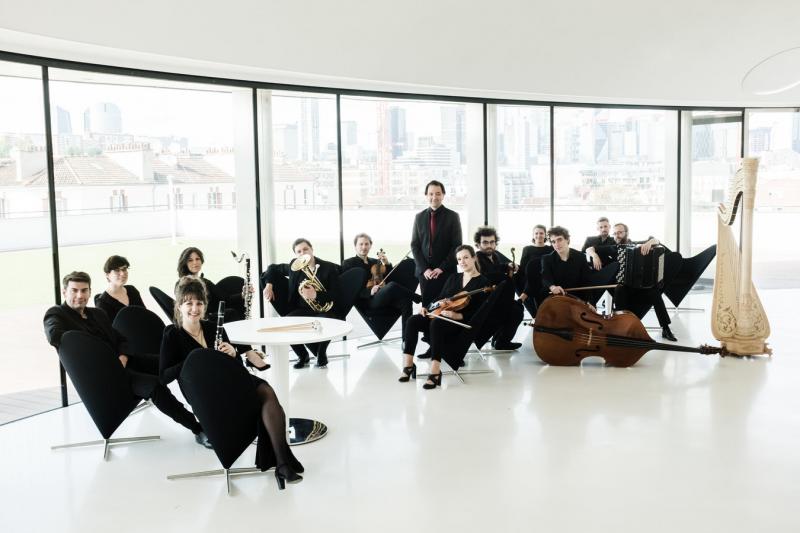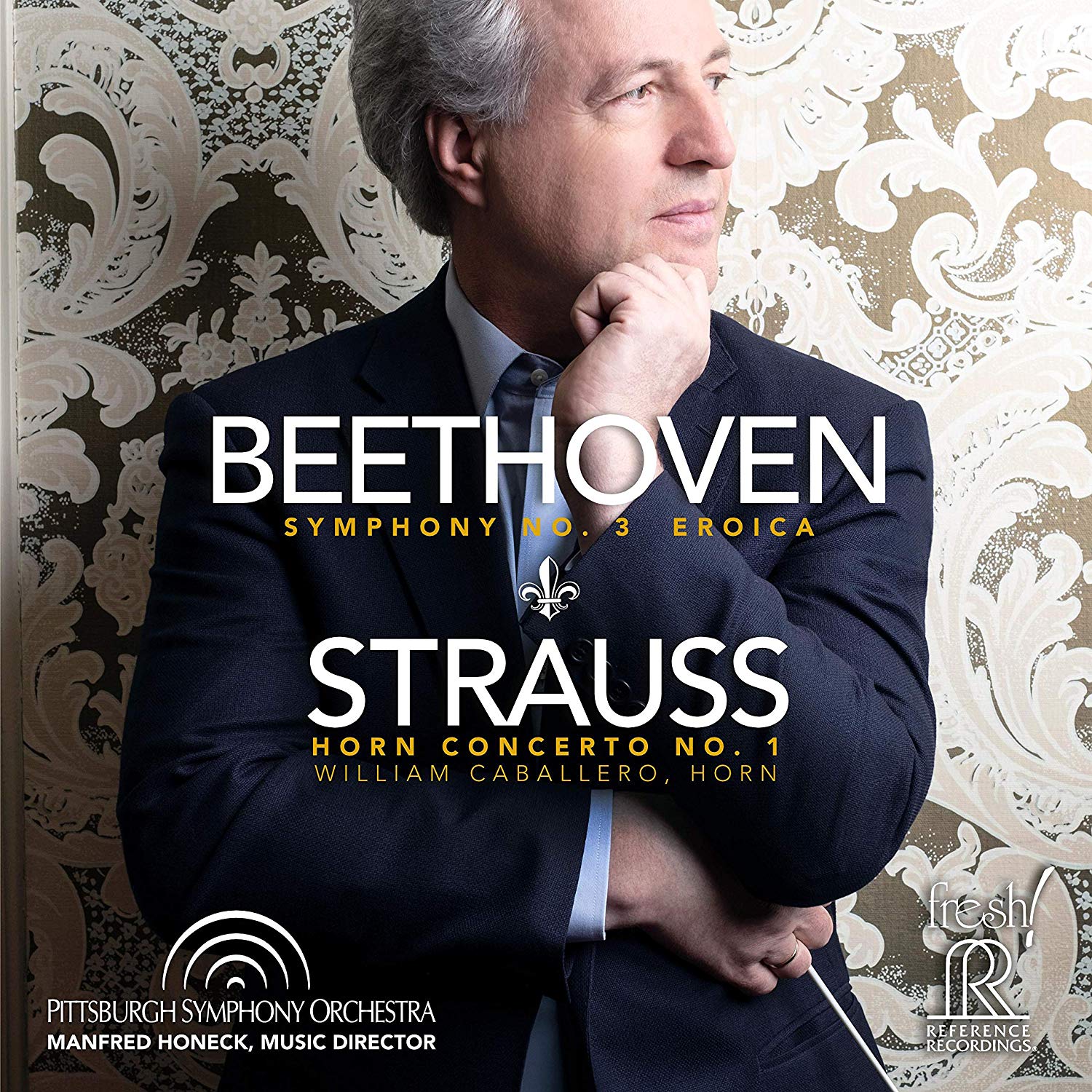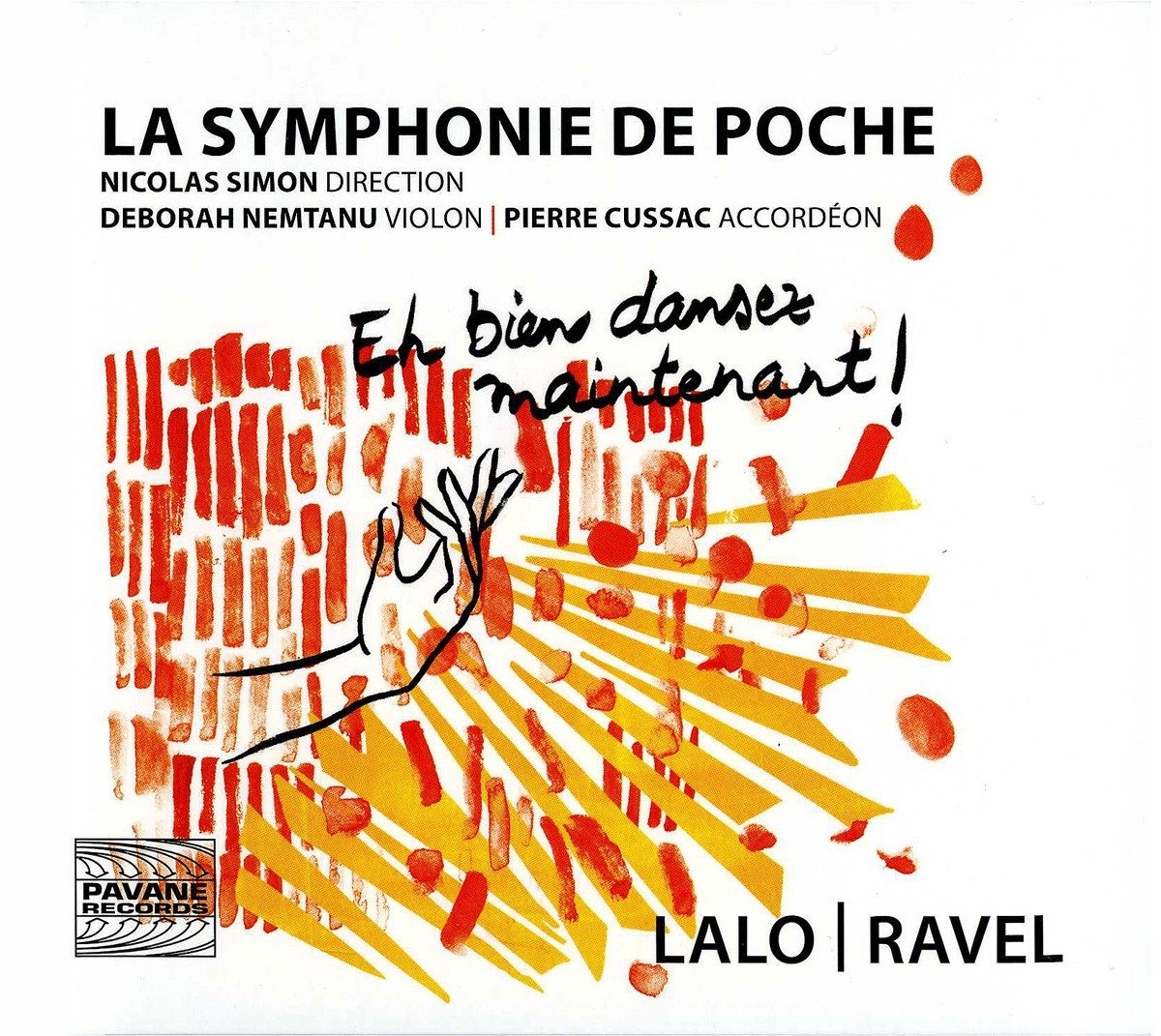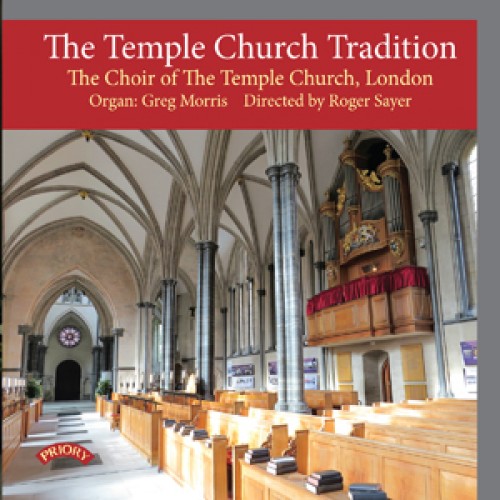Classical CDs Weekly: Beethoven, Strauss, La Symphonie de Poche, Temple Church Choir | reviews, news & interviews
Classical CDs Weekly: Beethoven, Strauss, La Symphonie de Poche, Temple Church Choir
Classical CDs Weekly: Beethoven, Strauss, La Symphonie de Poche, Temple Church Choir
Symphonic sturm und drang, downsized French music and a wide ranging choral compilation

 Beethoven: Symphony No 3, Strauss: Horn Concerto No 1 Pittsburgh Symphony Orchestra/Manfred Honeck, William Caballero (horn) (Reference Recordings)
Beethoven: Symphony No 3, Strauss: Horn Concerto No 1 Pittsburgh Symphony Orchestra/Manfred Honeck, William Caballero (horn) (Reference Recordings)
Funny how one's first experience of encountering a piece can still cast a shadow decades on; I first heard Beethoven’s Eroica on an old LP conducted by Otto Klemperer. Gaunt, tense and weighty, it's how I thought the piece had to go, and I've only got used to faster performances in recent years. Manfred Honeck’s live Pittsburgh performance doesn't quite hit Beethoven’s aspirational metronome mark but it opens pretty swiftly, his basic tempo giving the music a terrific swing. So far so Norrington, but coupled with an irresistibly rich orchestral sound built on rich-toned cellos and basses. Honeck's notes explain exactly what he does with the music and how he makes this “boisterous, stormy dance” such an exhilarating listening experience. Beethoven’s piercing, dissonant chords eight minutes in are an expressionistic scream here, and the extended coda is sheer bliss. What follows is as good; I was floored by the lower string chords nine minutes into the funeral march, and there's some sensational brass playing. And how well Honeck pulls us up from the abyss in the subsequent movements. As modern instrument performances go, this is up there with the best, and a worthy follow up to this team’s disc of symphonies 5 and 7.
It's coupled, unexpectedly but delightfully, with Strauss’s Horn Concerto No 1, also in E flat. Sixteen minutes long, it's a youthful romp, written by the teenage Strauss as a gift for his father – who found it too tricky and refused to perform the work. Pittsburgh principal horn William Caballero’s reading is big-boned and affectionate. The opening fanfare is bold in the extreme, but it's impressive to hear how well Caballero reins in his sound when needed. Brassy ebullience and cool sensitivity are perfectly balanced, and the final minutes are superb. All good then: I've yet to hear a disc from this source which is less than stellar. Do buy.
 Lalo: Symphonie espagnol, Ravel: La Valse, Tzigane La Symphonie de Poche/Nicolas Simon, with Deborah Nemtanu (violin), Pierre Cussac (accordion) (Pavane Records)
Lalo: Symphonie espagnol, Ravel: La Valse, Tzigane La Symphonie de Poche/Nicolas Simon, with Deborah Nemtanu (violin), Pierre Cussac (accordion) (Pavane Records)
Nicolas Simon’s Symphonie de Poche gave its first concert in 2008, born of Simon’s desire to create a small group “that could take music any place that music could go, without logistical constraints.” String and wind quintets soon became augmented with enticing extras, namely marimba, baritone saxhorn and accordion. The arrangements here are by Simon and bassist Lucas Henri. I'd hitherto regarded Lalo’s Symphonie espagnol as a frothy travelogue, but this pared-down performance boasts pungent, glowing colours and a characterful violin obbligato from Deborah Nemtanu. Great fun but a little inconsequential. More impressive is Henri’s transcription of Ravel’s Tzigane. Accordionist Pierre Cussac plugs plenty of the orchestral gaps, really coming into his own in a sharp, biting version of La Valse. This shouldn't be a fun piece, and the darkness feels accentuated in this arrangement.
Ravel's Bolero can seem like too much of a good thing. Henri’s version runs to less than half its usual length and rejigs the ostinato, claves tapping an Afro-Cuban rhythm known as Bembe (this is renamed Bolero/Bembero). Solos, particularly those from baritone and bass, are terrific, but it’s the sheer untrammelled joy of the thing which really hits home. Eight minutes pass in the blink of an eye, leaving you thirsty for a second hearing. Smart, affecting and very, very funny, it's worth the disc price alone. Lovely.
 The Temple Church Tradition The Choir of The Temple Church, London, dir. Roger Sayer, with Greg Morris (organ) (Priory)
The Temple Church Tradition The Choir of The Temple Church, London, dir. Roger Sayer, with Greg Morris (organ) (Priory)
This disc from London’s Temple Church almost squeezed into last week’s seasonal roundup by virtue of its containing an exquisite reading of Poulenc's Quatre motets pour le temps de Noël. When sung by exclusively male voices, Poulenc's harmonies sound just a little squelchier, more piquant. “Videntes stellam” is a case in point, the wise mens’ sense of wonder brilliantly expressed in musical terms. As if that’s not enough, Peter Avis’s sleeve note gives us a decent anecdote about the composer's moustache. Other seasonal delicacies include Britten's Corpus Christi Carol and four of Bach’s Advent Chorales accompanied by Greg Morris playing the organ preludes.
Fauré's charming Messe Basse grew from a collaboration with his pupil Messager, Fauré later replacing Messager’s movements with his own and adding an organ accompaniment. We get a euphonious motet by John Ireland, and an extended Easter Sequence by Kenneth Leighton. It's a real find, Leighton's two-part writing supremely singable, and the unnamed trumpet soloist plays very well. And a set of Alan Ridout’s Sacred Songs suits this choir's sound perfectly, a sequence of disarmingly approachable miniatures. Hats off to director Roger Sayer for giving us such a wide-ranging programme, warmly recorded too. Texts and translations are provided.
Explore topics
Share this article
The future of Arts Journalism
You can stop theartsdesk.com closing!
We urgently need financing to survive. Our fundraising drive has thus far raised £49,000 but we need to reach £100,000 or we will be forced to close. Please contribute here: https://gofund.me/c3f6033d
And if you can forward this information to anyone who might assist, we’d be grateful.

Subscribe to theartsdesk.com
Thank you for continuing to read our work on theartsdesk.com. For unlimited access to every article in its entirety, including our archive of more than 15,000 pieces, we're asking for £5 per month or £40 per year. We feel it's a very good deal, and hope you do too.
To take a subscription now simply click here.
And if you're looking for that extra gift for a friend or family member, why not treat them to a theartsdesk.com gift subscription?
more Classical music
 Hespèrion XXI, Savall, QEH review - an evening filled with laughter and light
An exhilarating exploration of innovation in 16th and 17th century repertoire
Hespèrion XXI, Savall, QEH review - an evening filled with laughter and light
An exhilarating exploration of innovation in 16th and 17th century repertoire
 theartsdesk at the Dublin International Chamber Music Festival - musical revelations, nature beyond
Artistic director Ciara Higgins’ programming ensures plenty of surprises
theartsdesk at the Dublin International Chamber Music Festival - musical revelations, nature beyond
Artistic director Ciara Higgins’ programming ensures plenty of surprises
 Müller-Schott, RSNO, Søndergård, Usher Hall, Edinburgh - spectacular Shostakovich to end the season
Brilliant orchestral results, while the cellist walks a tightrope in the Second Cello Concerto
Müller-Schott, RSNO, Søndergård, Usher Hall, Edinburgh - spectacular Shostakovich to end the season
Brilliant orchestral results, while the cellist walks a tightrope in the Second Cello Concerto
 Classical CDs: Cannons, culverts and mooching cattle
Box sets celebrating a pair of conductors, plus baroque vocal music and a beguiling bassoon anthology
Classical CDs: Cannons, culverts and mooching cattle
Box sets celebrating a pair of conductors, plus baroque vocal music and a beguiling bassoon anthology
 Marwood, Crabb, Wigmore Hall review - tangos, laments and an ascending lark
Accordion virtuoso’s brilliant arrangements showcase the possibilities of the instrument
Marwood, Crabb, Wigmore Hall review - tangos, laments and an ascending lark
Accordion virtuoso’s brilliant arrangements showcase the possibilities of the instrument
 Batiashvili, LSO, Pappano, Barbican review - French and Polish narcotics
Szymanowski’s fantasy more vague than Berlioz’s, but both light up the hall
Batiashvili, LSO, Pappano, Barbican review - French and Polish narcotics
Szymanowski’s fantasy more vague than Berlioz’s, but both light up the hall
 Owen, Manchester Camerata, Takács-Nagy, Stoller Hall, Manchester review - more Mozart made in Manchester
Another breath of fresh air in the chamber orchestra’s approach to the classics
Owen, Manchester Camerata, Takács-Nagy, Stoller Hall, Manchester review - more Mozart made in Manchester
Another breath of fresh air in the chamber orchestra’s approach to the classics
 Josefowicz, LSO, Mälkki, Barbican review - two old favourites and one new one
Julia Perry well worth her place alongside Stravinsky and Bartók
Josefowicz, LSO, Mälkki, Barbican review - two old favourites and one new one
Julia Perry well worth her place alongside Stravinsky and Bartók
 Classical CDs: Jelly Babies, porridge and kazoos
German art songs, French piano concertos and entertaining contemporary music
Classical CDs: Jelly Babies, porridge and kazoos
German art songs, French piano concertos and entertaining contemporary music
 Jean-Efflam Bavouzet, Wigmore Hall review - too big a splash in complete Ravel
Panache but little inner serenity in a risky three-part marathon
Jean-Efflam Bavouzet, Wigmore Hall review - too big a splash in complete Ravel
Panache but little inner serenity in a risky three-part marathon
 Karim Said, Leighton House review - adventures from Byrd to Schoenberg
The Jordanian pianist presents a magic carpet of dizzyingly contrasting styles
Karim Said, Leighton House review - adventures from Byrd to Schoenberg
The Jordanian pianist presents a magic carpet of dizzyingly contrasting styles

Add comment